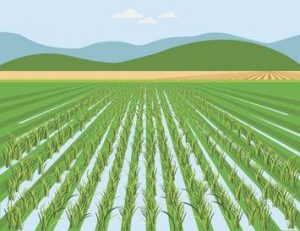Pradhan Mantri Dhan-Dhaanya Krishi Yojana:

The Prime Minister recently launched two new agriculture schemes, the PM Dhan Dhaanya Krishi Yojana (PMDDKY) and the Mission for Aatmanirbharta in Pulses, with a total outlay of `35,440 crore.
- It is a new scheme by the Indian government to support farmers.
- Under this scheme, farmers get direct financial help, new farming tools, crop insurance, and better market access.
- It targets 100 underperforming districts where farming faces challenges like low crop yields, water scarcity, and limited access to resources.
- It aims to support 1.7 crore farmers, particularly small and marginal farmers owning less than 2 hectares of land, who constitute 86% of India’s farming population.
- PMDDKY consolidates 36 existing agricultural schemes across 11 ministries, including PM-KISAN (cash transfers), PMFBY (crop insurance), PMKSY (irrigation), and Rashtriya Krishi Vikas Yojana (RKVY), into a unified program to streamline efforts and maximize impact.
- PMDDKY focuses on regions with low crop yields (e.g., wheat yields below 3.5 tonnes/hectare compared to the national average), moderate cropping intensity (below 155%, meaning fewer than 1.55 crop cycles per year), and limited access to credit.
- The scheme operates under the Ministry of Agriculture and Farmers’ Welfare, with oversight from a National Steering Committee, state-level nodal committees, and District Dhan Dhaanya Samitis led by District Collectors.
- PMDDKY’s Objectives:
- Increase crop yields by 20-30% through high-quality inputs and technology.
- Reduce reliance on monsoons with advanced irrigation systems like drip and sprinkler.
- Provide affordable tools and mechanization to enhance efficiency.
- Build storage infrastructure to cut post-harvest losses to under 5%.
- Offer loans and direct market access to double farmer incomes by 2030, aligning with the government’s extended goal from 2022 due to economic disruptions like COVID-19.
- Promote sustainable practices like organic farming to protect soil and water resources.
- Support women, youth, and allied sectors (e.g., dairy, fisheries, poultry) to diversify income sources.
- Achieve self-sufficiency in foodgrains, pulses, and oilseeds to reduce India’s dependence on imports.
- Key Benefits of PMDDKY:
- Increased Crop Yields: Access to high-yielding seeds (e.g., hybrid wheat yielding 4 tonnes/hectare), bio-fertilizers, and mechanized tools like seed drills to boost production.
- Higher Income: Diversifying into high-value crops like pulses (₹80-100/kg) and vegetables, and direct market access through apps to increase profits by 20-40%.
- Sustainable Farming: Organic fertilizers, water-saving irrigation, and climate-resilient crops to maintain soil health and reduce environmental impact.
- Irrigation Systems: Drip and sprinkler systems to ensure water availability, enabling year-round farming in dry regions.
- Storage Facilities: Village and block-level warehouses and cold storage to prevent spoilage of 20% of perishables like fruits, vegetables, and dairy.
- Financial Support: Subsidies (50-80% off inputs) and loans (short-term: ₹50,000–₹1 lakh; long-term: ₹1–10 lakh) through Kisan Credit Cards or NABARD.
- Market Access: Digital platforms like e-NAM and new PMDDKY apps to connect farmers directly to buyers, reducing middlemen and boosting profits.
- Training and Skill Development: Free workshops by Krishi Vigyan Kendras (KVKs), agricultural universities, and private partners on modern farming, drone use, and allied activities like beekeeping.
- Women Empowerment: Support for 10,000 women producer groups with training, loans, and market linkages for activities like dairy or organic farming.
- Global Exposure: Fully funded international training for 500 farmers in countries like Israel (expertise in drip irrigation), Japan (precision farming), or the Netherlands (greenhouse technology).




